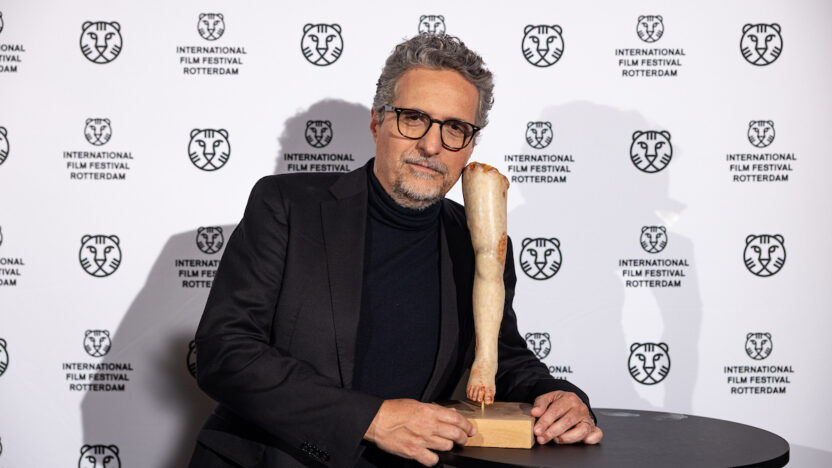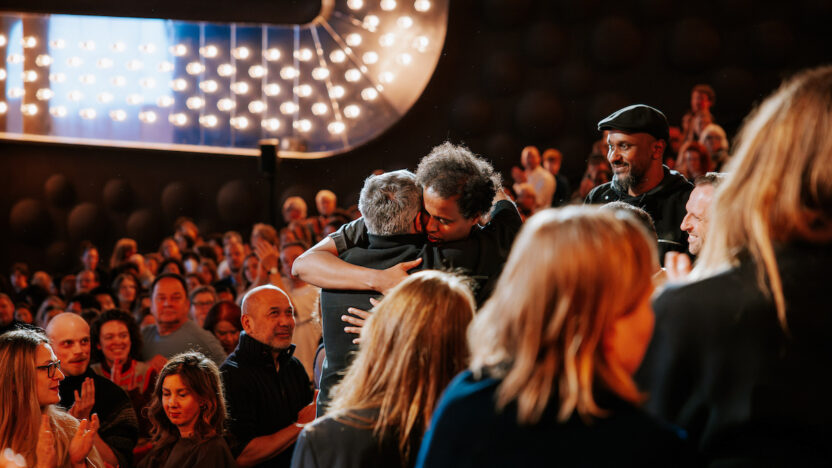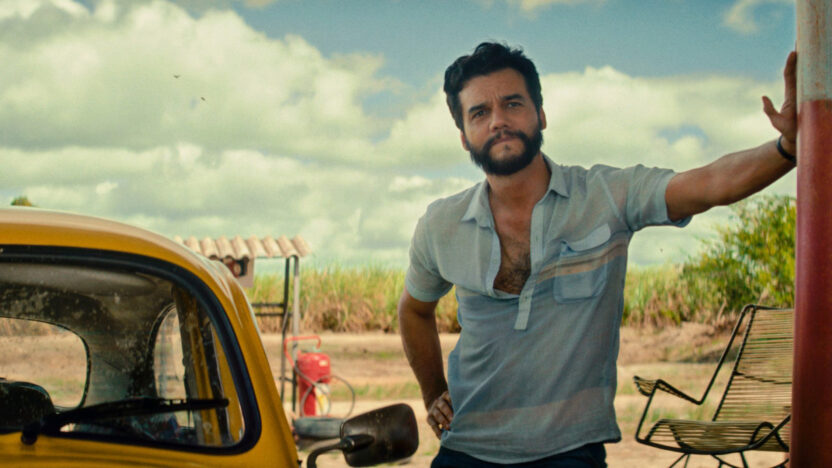Work with people you like: Aiko Masubuchi on Happyend
“It’s been a whirlwind!” says Aiko Masubuchi, checking in with IFFR Pro from Japan where her debut fiction feature as a producer, Happyend, is just starting its national release. Neo Sora’s near-future high school drama premiered in Venice earlier this year and has since been touring festivals internationally, at TIFF, Busan, and London, to name a few. She was one of two Rotterdam Lab alumni producers on the project, working alongside collaborator and 2023 graduate Albert Tholen.

“When did we first even meet?”
Producer, translator and programmer Masubuchi is an alumna of Rotterdam Lab, IFFR Pro’s talent development programme for emerging producers, which she was nominated to attend by VIPO (Visual Industry Promotion Organization, Japan) in 2021 during the online edition. Back then, she was already working on developing Happyend. She and the film’s director had both been hanging out in New York’s indie film scene. “We’re often like ‘when did we first even meet?’”, she jokes, explaining how they were drawn together as two bilingual speakers in English and Japanese, often bumping into each other at screenings.
Moving from Tokyo to New York for university, her path in film started out by putting on DIY loft screenings of her friends’ short films, which morphed into professional life as a curator. Ten years followed where she programmed for cultural institutions across New York, before going freelance and slowing down to return to her studies and reflect on her work, where she started dabbling in film production.
“Nobody took us seriously.”
“Nobody took us seriously,” she recounts, when they first started out on the project seven years ago. Sora had been mentioning the idea for a while, and had started on a first draft of the script. “Sometimes we look back on that folder of applications, and it’s just this very, very long list of things that we just didn’t get into.” They, along with producing partner Albert Tholen (nominated to the Lab by the Sundance Institute), knew they would first need to make a short, The Chicken (2020), which premiered in Locarno’s Pardi di Domani Competition.
“It was certainly all new to me” she reflects, explaining how although she’d met plenty of producers and filmmakers through her work as a programmer, “actually putting together the budget and understanding how to work through all of this” needed some context. This is where Rotterdam Lab came in.
“It was really important to be able to see the human side of everything.”
Not only were the practical sessions helpful, she took confidence from fellow participants. “As somebody who felt like I needed to navigate these industry standards, it was really important to be able to see the human side of everything.” Her peers and mentors were not solely driven by an illusive success or a clamber to advance in the industry, but by their passion for their work. “How do we make the film that we want to make?” was the shared motivation in the group. “And how do we also provide care and understanding and build relationships with the people we work with?”
Happyend was absolutely a film that the entire team wanted to make. Set in a high-school that treats its pupils like subjects after an AI surveillance system is installed, the rebellious students at the heart of the film find ways to dream of a better future. They throw secret raves, play pranks, stage protests and find solace in one another as they navigate an austere, nervous, Tokyo.
“We’re just sort of a group of friends who wanted to make this come true.”
A film with friendship at its heart was certainly made in that spirit, Masubuchi explains. As a team of producers, each brought their own areas of expertise to the project, like Sora’s old friend and collaborator Albert Tholen, Eric Nyari and Alex Lo. “We’re just sort of a group of friends who wanted to make this come true.” Part of what drew them together was working as a US-Japan co-production, navigating two languages and working across the two different industry contexts.

Another of the film’s producers, Anthony Chen (Ilo Ilo, 2013), she met during Rotterdam Lab when he was an expert mentor. “I just cold emailed him and was like, ‘I’m in the Lab. I didn’t get to talk to you, but I love your films.’” He agreed to take a look at the project and worked with us throughout: “he gave us amazing advice and encouragement to us as producers but also to Neo from the perspective of a director.”
“All the experienced producers were saying: ‘work with people you like.’”
This spirit of affinity that she found in Rotterdam Lab was her main takeaway. “All the experienced producers were saying: ‘work with people you like.’” She and Sora took the same approach into the film: “let’s actually trust our instincts and try to work with people, of course, who are very skilled at what they are doing, but also people we felt we could be friends with.” This ethos became the “compass” that guided them through the project.
Vividly illustrating the point, she gives the example of Pushim, the actor who plays Fukuko, the mother of one of the main characters, Kou, who runs a Korean eatery. This was her acting debut, but she’s well known in the music scene “as the queen of Japanese reggae.” She’s also very vocal about political and social issues, speaking both as an artist and as a Zainichi Korean person who does not have the right to vote in Japan.
“When we asked her to be in the film, it was surreal in a way, because this was this person that I had listened to in high school when I was having my first political awakening, and to be able to work with her in this way felt like a full circle in a sense.”
“So much of what we were worried about is very much coming true in many ways.”
Pushim’s activism is one of the ways in which the politics of film, its take on creeping authoritarianism, surveillance, digital culture, racism, division and protest, makes its way outside the screen. These are all issues that drove those who worked on the film. “We had set this in the near-future and yet so much of what we were worried about is very much coming true in many ways.”

“Everybody navigates things in their own way.”
Keeping the essence of what motivated the team was one of Masubuchi’s preoccupations when she started out as a producer on the project, and will continue to be so as she looks to the future. “You think you’re coming into somewhere where there are certain rules or strict things that we have to abide by,” she says of the daunting appearance of the film industry. “But actually, everybody navigates things in their own way. It’s really important to keep what is true to yourself and what your own sense of ethics and what your own thoughts and beliefs are.”
A list with articles
-

The Secret Agent director Kleber Mendonça Filho remembers his first IFFR visit: “we came with 10 posters and 200 postcards”
Published on:-
Hubert Bals Fund
-
Interview
-
-
-

IFFR closes its 55th edition celebrating an uptick in new, younger audiences and industry attendees
Published on:-
News
-
Press release
-

